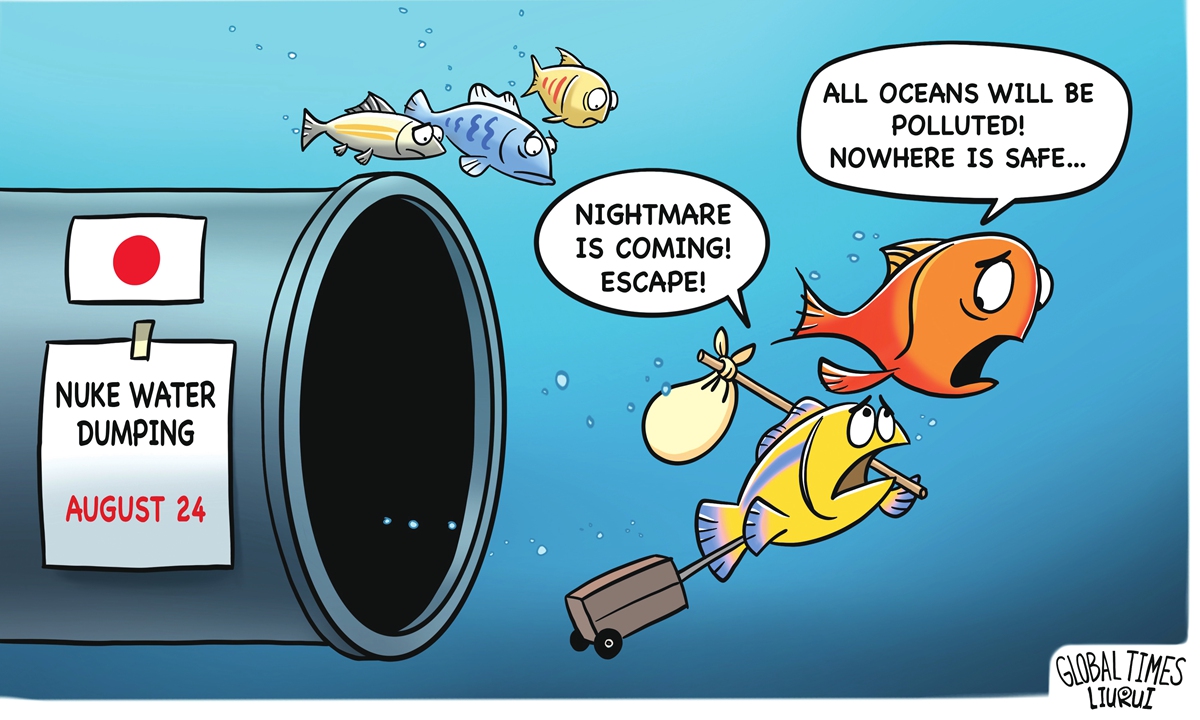
Illustration: Liu Rui/GT
The Japanese government convened a cabinet meeting on August 22, and decided to initiate the operation of dumping nuclear-contaminated water from the Fukushima Daiichi nuclear power plant into the ocean on August 24, despite strong opposition both domestically and internationally. This timing is filled with calculations by the Japanese government, being both premeditated and executed as a swoop. Information obtained by the Global Times indicates that the final dumping date has been repeatedly changed, partly due to the intention of certain members within the Japanese cabinet to provide the Japanese people with a "last clean summer." However, now it seems that even if it's the "last clean summer," the Japanese government is unwilling to allow the Japanese people and the entire world to experience it fully.
Just as the Chinese side said, "Japan's headstrong push for the dumping of nuclear-contaminated water into the ocean is undoubtedly placing the global marine environment and the health of all humanity at stake." Once the floodgates of over a million tons of Fukushima nuclear-contaminated water into the Pacific Ocean are opened, this won't be a matter of just a day or two. It will involve uninterrupted discharges for 30 years or even longer. There is no precedent in human history for such a prolonged, large-scale release of nuclear-contaminated water into the ocean. Considering the effects of radioactive material deposition, no one knows the extent of the severe consequences that will be brought once this Pandora's box is opened. August 24, 2023, might well be recorded in history as a catastrophic day for the marine environment.
It needs to be emphasized that this by no means signifies Japan's success in overcoming its challenges; rather, it will inevitably incur costs far beyond its initial expectations. Some of the costs, not yet visible, might even be more severe. This will result in significant harm by Japan to the overall interests of the Asia-Pacific region, and an indelible permanent stain on its international reputation. Japan will have to bear an enduring and inescapable responsibility in terms of marine ecological issues. It will face incessant criticism and accountability from the global community including its own citizens, indefinitely. In other words, Japan has committed a public crime without a statute of limitations, and in the end, it will realize that today's decision is penny wise and pound foolish.
Just in the past two days, individuals from the Japanese fishing industry once again firmly expressed their "strong opposition" to the plan of discharging contaminated water into the sea. The latest public opinion poll reveals that a staggering 88.1 percent of surveyed Japanese respondents are concerned about the potential damage to Japan's image due to the ocean dumping plan. This glimpse into Japanese public sentiment is quite telling. However, these views have not been accepted by the Japanese government, and it has not changed its established policy at all. The hypocritical and selfish face of the Japanese authorities is completely exposed to the world. Facing Japanese public opinion, fishermen's interests, the Pacific ecological environment, and the demands of neighboring countries, the Japanese government has chosen convenience and cost-saving.
In addition, Fumio Kishida just returned from the Camp David meeting in the US and immediately started pushing the dumping of nuclear-contaminated water into the ocean. This is hardly a coincidence. We have reason to believe that the US, Japan, and South Korea have reached some sort of political deal regarding the dumping of nuclear-contaminated water into the ocean, which emboldened the Japanese authorities to aggressively promote this action. The US, out of geopolitical needs, has given the green light to the dumping plan, and has assisted Japan in managing international public opinion while suppressing opposition. South Korea bears the brunt of Japan's dumping of nuclear-contaminated water, and one can imagine how strong South Korean society's concern about and opposition to the dumping plan is. This makes the ambiguous and even lenient attitude of the South Korean government toward the dumping plan extremely abnormal and conspicuous. The roles played by the governments of the US, Japan, and South Korea in this issue are all very disgraceful.
The treatment of nuclear-contaminated water is indeed a scientific issue, but the Japanese government is not qualified to use science as an excuse. The Chinese side, including the Global Times, has previously published many editorials pointing out the harm of the ocean discharge plan to the marine ecological environment from a scientific perspective. We won't go into details here. We just want to ask the Japanese government a simple question. As Japan announces the time for dumping, the Kanto and northern regions of Japan are suffering from severe drought and some agricultural water reservoirs in Niigata Prefecture have already dried up, resulting in withered crops in many farmlands. Since the Japanese government repeatedly guarantees that the nuclear-contaminated water is safe, even drinkable, why not use this water for drought relief? The Kanto region is not far from Fukushima. Isn't it a huge waste to dump precious, safe-to-drink water into the ocean?
China's attitude toward the dumping of nuclear-contaminated water is clear and consistent. It is based on the standpoint of safeguarding the public and long-term interests of humanity, including the Japanese people, rather than trying to pick a fight with Japan. There is a Chinese saying, "spilt water is hard to retrieve." Once the nuclear-contaminated water is discharged into the ocean, the consequences are irreversible. Japan cannot escape the responsibility it must bear.




